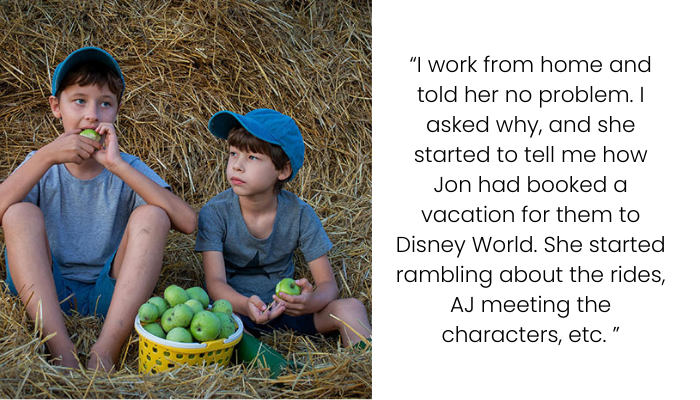Is It Wrong to Call Out a Sister for Favoring One Child Over Another During a Family Vacation?
In a recent family dispute, a 26-year-old woman was asked by her sister, Emma (30), to watch her 11-year-old nephew, Eli, for a week in June. The reason? Emma’s husband, Jon, had planned and paid for a vacation to Disney World for Emma and their 5-year-old son, AJ, excluding Eli from the trip. When questioned, Emma defended the decision, stating that Jon shouldn’t be expected to pay for a child that isn’t biologically his. This led to a heated exchange, with the sister accusing Emma of being a neglectful mother, resulting in Emma ending the call abruptly.
Parents playing favorites can hurt their kids—something this woman wasn’t shy about telling her sister

Her sister had asked her if she could look after one of her kids, because she was taking the other one to Disney World




The Emotional and Legal Implications of Excluding a Stepchild from Family Vacations
The decision to exclude a stepchild from a family vacation is not merely a logistical choice; it carries profound emotional and psychological ramifications that can affect the child’s well-being and the family’s dynamics. In the scenario described, Emma’s decision to leave her 11-year-old son, Eli, behind while taking her younger son, AJ, on a vacation to Disney World with her husband, Jon, raises critical concerns about the impact on Eli’s emotional health and the legal responsibilities of stepparents.
Emotional Consequences of Exclusion
Children’s sense of belonging and self-worth is significantly influenced by their inclusion in family activities. Exclusion can lead to feelings of rejection, low self-esteem, and emotional neglect. According to Psychology Today, being excluded increases the likelihood of someone feeling as though they don’t belong, experiencing low self-esteem, and lacking their sense of control . For a child like Eli, who has already experienced the absence of his biological father, being left out of a family vacation could reinforce feelings of abandonment and unworthiness.
Moreover, the psychological effects of social exclusion in children can be severe. Research indicates that children who feel excluded are more likely to experience anxiety, depression, and behavioral issues. The Quirky Kid Clinic notes that social exclusion can compromise children’s physical, emotional, and mental health, leading to reduced self-esteem, feelings of anxiety, depression, and aggression . These effects can have long-term consequences, potentially impacting Eli’s academic performance and social relationships.
Legal Considerations for Stepparents
Legally, stepparents often have limited rights and responsibilities concerning their stepchildren. In many jurisdictions, a stepparent does not have the legal authority to make decisions for a stepchild unless they have legally adopted the child or have been granted guardianship. According to Custody X Change, as a stepparent, you won’t have the legal jurisdiction to make decisions for your stepchild, which includes giving consent for medical care or signing school forms .
However, while the law may not mandate financial support from a stepparent for a stepchild, ethical considerations come into play, especially in blended families where the stepparent plays a significant role in the child’s life. The decision to exclude a stepchild from a family vacation, particularly when the stepparent is funding the trip, can be perceived as favoritism and may damage the trust and bond between the stepparent and stepchild.
Impact on Family Dynamics
Excluding a child from a family vacation can create divisions within the family unit, leading to resentment and strained relationships. The child who is left behind may feel less valued, while the included child may develop a sense of superiority or entitlement. This dynamic can disrupt sibling relationships and undermine the cohesion of the family.
Furthermore, the excluded child may internalize the belief that they are not truly part of the family, leading to long-term identity and attachment issues. The Raising Children Network emphasizes that children need regular interaction with attachment figures to maintain relationships, and extended separation from a parent or parental figure can hinder the development of attachment and relationship between the child and the parent .
Ethical Implications and Parental Responsibilities
While financial constraints are a reality for many families, the ethical responsibility of parents and stepparents to treat all children equitably remains paramount. Decisions that prioritize one child’s experiences over another’s can have lasting negative effects on the excluded child’s emotional development.
In the case of Emma and Jon, the decision to exclude Eli from the vacation, especially when Jon is funding the trip, sends a message that Eli is not equally valued in the family. This action not only affects Eli’s self-esteem but also reflects on Emma’s role as a mother in advocating for her child’s inclusion and well-being.

In the comments, netizens swiftly concluded that the woman wasn’t overreacting, with some suggesting she make her time with Eli as much fun for him as possible





The exclusion of a stepchild from a family vacation is a decision fraught with emotional, psychological, and ethical implications. While legal obligations may not require a stepparent to include a stepchild in such activities, the emotional well-being of the child and the health of the family unit depend on inclusive and equitable treatment. Parents and stepparents must consider the long-term impact of their decisions on all children involved, striving to foster a sense of belonging and security within the family.

